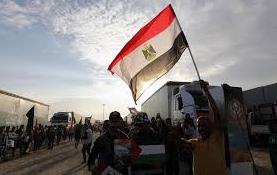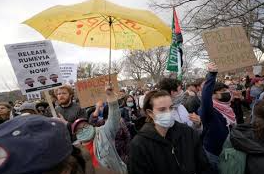
As Egypt Plays an Increasingly Public Role, Promises of Rebuilding and Support for Gaza Surge
Since Egypt brokered a ceasefire between Israel and Hamas last May, it has taken on a more visible role in Gaza’s reconstruction. No longer working behind the scenes, Egypt is now sending teams to clear rubble and has pledged significant resources towards rebuilding the war-torn region, including the construction of large new residential complexes. Egyptian flags, along with banners promoting President Abdel-Fattah el-Sissi, are now a common sight across Gaza.
Egypt has long been involved in mediating between Israel and Hamas, working to secure truce agreements and push for reconciliation among Palestinian factions. However, its recent shift to a more public position marks a new chapter in the country’s diplomatic efforts, as it presents itself as a regional peacemaker. This strategy could help Egypt delay or prevent further violence, while also bolstering its standing as an indispensable security partner for both Israel and the United States, which see Egypt as a key player in the Middle East.
With its influence over Rafah—the only Gaza border crossing that bypasses Israel—Egypt has leverage over Hamas. Despite the blockade imposed after Hamas’ takeover of Gaza in 2007, Egypt has gradually eased restrictions, tacitly acknowledging Hamas’ control. In the wake of the ceasefire, Egypt committed $500 million to rebuild Gaza and began sending crews to clear debris. It is also financing the construction of three new towns aimed at housing around 300,000 people.
While the precise amount of aid delivered remains unclear, the projects continue, with work already underway on Gaza’s main coastal road. Local contractors have reported that the influx of materials and funds is critical for Gaza’s recovery, providing thousands of jobs and fostering hope for the region’s future.
The Egyptian presence is evident across Gaza, with Egyptian flags flying over construction sites and Egyptian trucks delivering materials via Rafah. This marked contrast to the slow flow of goods through Israeli-controlled crossings highlights Egypt’s growing role in Gaza’s rebuilding efforts.
As Egypt strengthens its position in Gaza, its ability to pressure Hamas is growing. It can close the Rafah crossing at any time, effectively sealing off Gaza. This power, along with Egypt’s strategic diplomatic influence, is viewed as key to maintaining the fragile peace and preventing further conflict.












